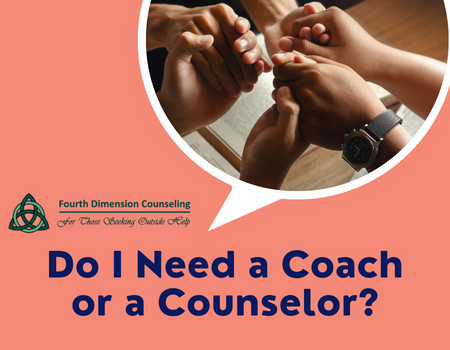Embarking on a journey of self-discovery and personal growth often prompts the question: Do I need a coach or a counselor? Both roles serve distinct purposes in supporting individuals through various challenges, but understanding the differences between coaching and counseling is essential for making an informed decision. This article explores the distinctions between the two professions, helping individuals determine whether a coach or a counselor is the right fit for their specific needs.
Coaching:
-
 Focus on Goal Achievement:
Focus on Goal Achievement:
- Coaches are primarily focused on helping individuals set and achieve specific goals, whether personal or professional.
- The coaching process involves identifying aspirations, creating action plans, and providing accountability to facilitate progress.
-
Forward-Looking Perspective:
- Coaching emphasizes the present and the future, aiming to empower individuals to move forward and reach their desired outcomes.
- Coaches often work with clients who are seeking personal development, career advancement, or improved performance in a particular area.
-
Skill-Building and Performance Enhancement:
- Coaches assist in developing and refining specific skills, fostering personal growth, and enhancing performance.
- The coaching relationship is collaborative, with the coach serving as a guide and motivator to help clients unlock their potential.
-
Short-Term and Solution-Focused:
- Coaching is generally more short-term and solution-focused, with a specific timeframe for achieving identified goals.
- The emphasis is on actionable steps and tangible results.
Counseling:
-
Addressing Emotional and Psychological Challenges:
- Counselors, also known as therapists or psychotherapists, specialize in addressing emotional, psychological, and mental health challenges.
- Counseling is often sought for issues such as anxiety, depression, trauma, grief, or relationship difficulties.
-
Exploring the Past and Present:
- Counseling delves into both past and present experiences, aiming to understand and address the root causes of emotional struggles.
- Therapists provide a safe space for individuals to explore their thoughts and feelings.
-
Holistic Well-Being:
- Counselors work toward holistic well-being, considering emotional, mental, and relational aspects of an individual’s life.
- The therapeutic relationship is built on trust and confidentiality, allowing clients to share and process their experiences without judgment.
-
Long-Term and Healing-Oriented:
- Counseling often involves a longer-term commitment, especially when addressing deep-seated emotional issues.
- The focus is on healing and personal growth, with an understanding that progress may take time.
Choosing Between a Coach and a Counselor:
-
Identify Your Goals:
- If you have specific, goal-oriented objectives related to personal or professional development, a coach may be the right choice.
- If you are grappling with emotional challenges or seeking to understand and address deeper issues, counseling may be more appropriate.
-
Consider Timeframe:
- Assess whether your needs align with a short-term, goal-focused approach (coaching) or a more extended, healing-oriented process (counseling).
-
Reflect on the Nature of Your Challenges:
- If your challenges are predominantly related to skills, performance, or achieving specific outcomes, coaching may be suitable.
- If your challenges involve emotional well-being, mental health, or relational issues, counseling may offer the necessary support.
-
Evaluate Comfort and Trust:
- Consider the level of comfort and trust you feel with the professional. The success of both coaching and counseling often hinges on the strength of the therapeutic relationship.
Choosing between a coach and a counselor ultimately depends on your unique needs and goals. Whether you seek support for achieving specific objectives or addressing emotional well-being, both coaching and counseling play vital roles in guiding individuals toward a more fulfilling and balanced life. It’s essential to recognize that the decision is not mutually exclusive, and individuals may find value in both coaching and counseling at different stages of their personal growth journey.
